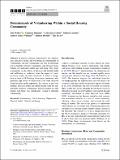Files in this item
Determinants of volunteering within a social housing community
Item metadata
| dc.contributor.author | Walker, Tim | |
| dc.contributor.author | Menneer, Tamaryn | |
| dc.contributor.author | Leyshon, Catherine | |
| dc.contributor.author | Leyshon, Michael | |
| dc.contributor.author | Williams, Andrew James | |
| dc.contributor.author | Mueller, Markus | |
| dc.contributor.author | Taylor, Timothy | |
| dc.date.accessioned | 2020-10-12T09:30:02Z | |
| dc.date.available | 2020-10-12T09:30:02Z | |
| dc.date.issued | 2020-09-28 | |
| dc.identifier | 270045200 | |
| dc.identifier | fae2ab2e-4f1a-4288-8ad4-510e95bb4cc3 | |
| dc.identifier | 85091681440 | |
| dc.identifier | 000573501600003 | |
| dc.identifier.citation | Walker , T , Menneer , T , Leyshon , C , Leyshon , M , Williams , A J , Mueller , M & Taylor , T 2020 , ' Determinants of volunteering within a social housing community ' , Voluntas: International Journal of Voluntary and Nonprofit Organizations , vol. First Online . https://doi.org/10.1007/s11266-020-00275-w | en |
| dc.identifier.issn | 0957-8765 | |
| dc.identifier.other | ORCID: /0000-0002-2175-8836/work/82179839 | |
| dc.identifier.uri | https://hdl.handle.net/10023/20764 | |
| dc.description | The Smartline project is receiving up to £4,188,318 of funding from the England European Regional Development Fund (Grant No. 05R16P00305) as part of the European Structural and Investment Funds Growth Programme 2014–2020. The Ministry of Housing, Communities and Local Government (and in London the intermediate body Greater London Authority) is the Managing Authority for European Regional Development Fund. Additional funding is from the South West Academic Health Science Network. | en |
| dc.description.abstract | In general research demonstrates that deprivation, education, health, and well-being are determinants of volunteering, and that volunteering can play an important role in building stronger communities and provides many benefits for individual health and well-being. This study concentrates on the effects of physical and mental health and well-being as predictors when the aspect of socioeconomic impact has been minimised. It utilises a unique data-set from a UK Housing Association community with generally high levels of deprivation. Data were analysed using bivariate probit regression. In contrast to previous findings, physical health and mental health were not significantly related to volunteering. The key finding was that mental well-being was significantly related to informal volunteering. | |
| dc.format.extent | 13 | |
| dc.format.extent | 612720 | |
| dc.language.iso | eng | |
| dc.relation.ispartof | Voluntas: International Journal of Voluntary and Nonprofit Organizations | en |
| dc.rights | Copyright © The Author(s) 2020. This article is licensed under a Creative Commons Attribution 4.0 International License, which permits use, sharing, adaptation, distribution and reproduction in any medium or format, as long as you give appropriate credit to the original author(s) and the source, provide a link to the Creative Commons licence, and indicate if changes were made. The images or other third party material in this article are included in the article's Creative Commons licence, unless indicated otherwise in a credit line to the material. If material is not included in the article's Creative Commons licence and your intended use is not permitted by statutory regulation or exceeds the permitted use, you will need to obtain permission directly from the copyright holder. To view a copy of this licence, visit http://creativecommons.org/licenses/by/4.0/. | en |
| dc.subject | Volunteering | en |
| dc.subject | Social housing | en |
| dc.subject | Deprivation | en |
| dc.subject | Physical health | en |
| dc.subject | Mental well-being | en |
| dc.subject | HN Social history and conditions. Social problems. Social reform | en |
| dc.subject | NDAS | en |
| dc.subject | SDG 3 - Good Health and Well-being | en |
| dc.subject.lcc | HN | en |
| dc.title | Determinants of volunteering within a social housing community | en |
| dc.type | Journal article | en |
| dc.contributor.institution | University of St Andrews.School of Medicine | en |
| dc.contributor.institution | University of St Andrews.Population and Behavioural Science Division | en |
| dc.identifier.doi | 10.1007/s11266-020-00275-w | |
| dc.description.status | Peer reviewed | en |
This item appears in the following Collection(s)
Items in the St Andrews Research Repository are protected by copyright, with all rights reserved, unless otherwise indicated.

